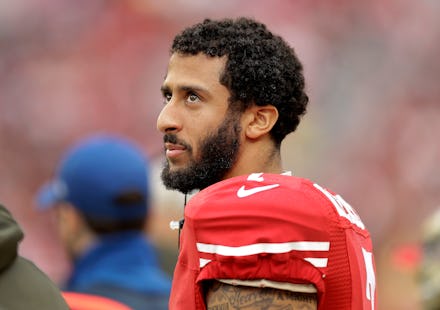Reaction to Colin Kaepernick proves some people won't ever be satisfied with black protest

Apparently, some white people can't make up their minds about what black protest should look like.
By now, many people have learned of San Francisco 49ers quarterback Colin Kaepernick's decision not to stand for the singing of the national anthem before a preseason NFL game on Friday. This is his way of protesting police brutality and other inequities experienced disproportionately by African-Americans and people of color, he said.
On its surface, what Kaepernick has done is a form of peaceful protest. It has drawn criticism from some black people, and also criticism from some angry, sometimes racist, white people. Some have shared video of Kaepernick's No. 7 jersey being set aflame to a "Star-Spangled Banner" soundtrack. New Orleans Saints quarterback Drew Brees tweeted that he disagreed with the method of Kaepernick's protest, while controversial conservative pundit Tomi Lahren suggested that the biracial 49ers quarterback should be grateful to the two white parents who raised him. Even his biological mother called him out on Twitter for "bringing shame" to the country.
In recent years, civil unrest and rioting have often followed acts of state-sanctioned violence toward black people in the United States. In Ferguson, Missouri, after the police shooting death of unarmed and black 18-year-old Michael Brown, and after Freddie Gray died of an injury sustained in police custody in Baltimore, some people responded by damaging and looting businesses and hurled objects at police in riot gear. In response, white people condemned this type of protest as uncivilized and unpatriotic, dismissing the underlying concerns of the protesters.
So, if violent protests are bad and Kaepernick's sit-down during the nation's patriotic hymn is also bad, what exactly is acceptable?
For athletes in particular, this has been a relevant question for decades. Most notably, it came up at the Cleveland Summit, when a group of prominent black athletes gathered in 1967 to support the late boxer Muhammad Ali's decision to dodge the draft as a conscientious objector to the Vietnam War. Because of Ali's refusal, he would go on to be convicted of a federal offense, stripped of his boxing title and banned from the sport in his prime years.
Ali is far from the only black athlete or public figure to face reprimand or intense public backlash over protests. At the 1968 Olympics, track and field athletes Tommie Smith and John Carlos raised "Black Power" fists in protest of racism in the U.S., as the national anthem played during the medal ceremony. They were suspended from the U.S. Olympic team, had to give up their medals and kicked out of the Olympic Village in Mexico City.
In July, WNBA players who wore plain, black warm-up shirts to acknowledge the police shootings of Philando Castile and Alton Sterling were fined hundreds of dollars by the league.
And of course, it's not just athletes who face criticism. Pop icon Beyoncé prompted calls from police officers in February to boycott her U.S. concert tour dates, after she and her dancers performed the Super Bowl halftime show in outfits that paid homage to the Black Panther Party. Her music video for "Formation," released a day before the Super Bowl, featured "stop shooting us" graffiti interspersed between images of police officers in riot gear and a squad car submerged in water.
In each of these instances, criticism was often rooted in a short-sighted tendency to attack the protest and not the real problem. NBA legend Kareem Abdul-Jabbar, who was also part of the Cleveland Summit, perfectly addressed that issue in a message of support for Kaepernick.
"What should horrify Americans is not Kaepernick's choice to remain seated during the national anthem, but that ... we still need to call attention to the same racial inequities [that existed 50 years ago]," Abdul-Jabbar wrote in Washington Post op-ed published Tuesday. "Failure to fix this problem is what's really un-American here."
Abdul-Jabbar also said he thought Kaepernick's protest was done in "a highly patriotic manner that should make all Americans proud."
"Patriotism isn't just getting teary-eyed on the Fourth of July or choked up at war memorials," he wrote. "It's supporting what the Fourth of July celebrates and what those war memorials commemorate: the U.S. Constitution's insistence that all people should have the same rights and opportunities and that it is the obligation of the government to make that happen. When the government fails in those obligations, it is the responsibility of patriots to speak up and remind them of their duty."
NFL icon and actor Jim Brown, who was also part of the Cleveland Summit with Adbul-Jabbar, threw his support behind Kaepernick, too.
"I listen to him, and he makes all the sense in the world," Brown said in an interview with NFL Total Access. "I am with him 100%."
The NFL has said it will not punish Kaepernick for asserting his right to sit during the national anthem. As for the public, broader support for Kaepernick may take many more years, and history has shown us that.
During the civil rights movement, activists staged sit-ins at segregated lunch counters, sat down in bus seats reserved for white people and engaged in civil disobedience to register voters. Clearly, racist white people did everything they could — violently or otherwise — to disparage these forms of protest.
But today, for the most part, those civil rights activists are viewed as heroes — revolutionaries who sparked change for black people in this nation, and who have shaped Kaepernick's method of protest. With more and more white people chiming in to rebuke his actions, it's clear that they are ignoring history's examples of effective protesting. Despite negative critiques from the sidelines throughout various movements, black protest undoubtedly continues to push the United States of America closer to reflecting the ideals of the national anthem.